Ten Things I've Learnt About Love
by Sarah Butler
In very disparate parts of London, two stories begin that, as Sarah Butler's debut novel progresses, become steadily intertwined. One story is of 28 year-old Alice, who returns to Hampstead Heath from a trip to Mongolia just in time to see her father before he dies of pancreatic cancer. Alice has never fit in with her hardheaded, practical family; now that she is home, she has to find a way to navigate the complexities of dealing with her two sisters, Cee and Tilly, who will never understand her need to escape London. Reinforcing the psychological barrier between herself and her sisters, Alice blames herself for a car accident in which their mother died years before.
Meanwhile, on the streets of London, in areas such as Canary Wharf and the Angel tube station, Daniel wanders aimlessly. For years he has been homeless, haunted by memories of the woman who left him and the daughter he has never seen. Daniel's entire being is focused on someday finding his daughter, though he has nothing to go on except her name. Because he has synesthesia, Daniel sees this name in colors and images, and these visuals become a constant preoccupation for him. It is only when he spies a funeral announcement in the newspaper that Daniel suddenly sees his chance--and thus begins his trek to the stately residential neighborhood of Hampstead Heath.
Butler begins each chapter of Ten Things I've Learnt About Love with a list of things that provide insight into the lives of the characters, such as "Ten foods that stress me out" or "Ten places I've spent the night." While it might seem gimmicky, this motif emphasizes the novel's themes of familial love and its binding qualities, connections beyond any other kind. As Alice investigates the mysteries left in the wake of her father's death, she is forced to acknowledge that her parents were more complicated than she could have ever imagined. She also feels compelled to question her own loyalty to her family, a conflict made tangible by her ex-boyfriend Kal. By keeping his relationship with Alice hidden from his traditional Muslim parents, Kal demonstrated through his actions that familial love was more important to him than romantic love. This revelation of the importance of family is one with which Alice struggles as she contemplates whether to stay in London and work on her relationship with her sisters--or to run away again to a distant country.
The revelations about romantic love come from another quarter--via Daniel and his memories of Alice's mother, Julianne, with whom he had a tempestuous affair. Like Alice, Julianne was imbued with a need to escape her mundane life, a need that may have been the cause of her accidental death. Through Julianne and, later, through Alice's conflicted feelings about her sisters, the tension between the commitment of love and the need for escape is a recurring theme. In this manner Butler interweaves the themes of romance and family, indicating the ways in which they inevitably intersect and challenge one another.
Perhaps the greatest strength in Ten Things I've Learnt About Love is the author's gift for detail, which translates into the depiction of the very different worlds of the two protagonists. With a sure hand, Butler guides the reader through days in the life of a homeless man--the places where he can take shelter, the people he meets, the way he is perceived in public places. There is an unexpected abundance of kindness for Daniel: while there are of course many who recoil from him, there are also people who show a sincere desire to help. The daily details of life on the London streets and in shelters shed light on a side of life that most people will never see. Daniel's life turns out to be surprisingly social even though he is alone--he meets others in his situation with whom he can confide or reminisce, and the volunteers he meets are integral to his life. A particular sequence in which a shelter volunteer helps Daniel groom himself for an important occasion is both moving and compelling in its portrayal of behind-the-scenes kindness.
In Alice's world of Hampstead Heath, Butler explores the intimate topography of grieving and loneliness. Ironically, Alice is just as cut off from human companionship as Daniel; she has no friends of significance, no love life, and feels at a remove from her family. Therefore, when Alice agrees to prepare her father's house for the market, the task takes over her life; the details of clearing the home of its many memories bear a resemblance to the washing away of a life. By so decisively eliminating the past, Alice is creating a void that can only be filled with the promise of a future. What that future may hold, and whether Daniel can ever have a place in it, is the central question explored in this book. --Ilana Teitelbaum



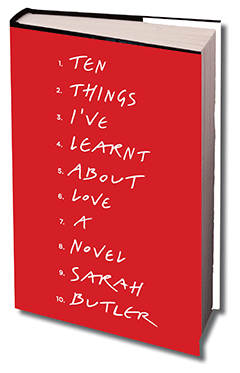
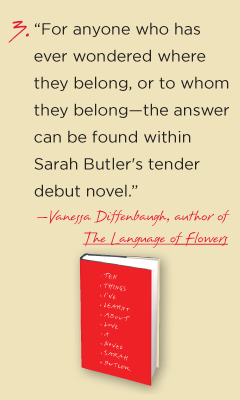
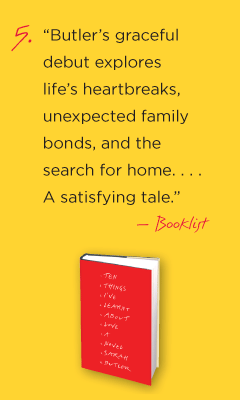


_Eva_Sajovic.jpeg)
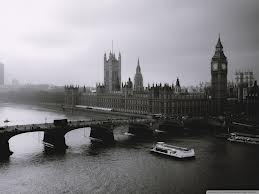 London is such a big, sprawling, diverse city. It's the kind of place you can be anonymous in if you choose to be, and also a place you can find connections in. It's an ideal setting for the story because of its diversity, I think--by the fact that it contains so many different spaces, and different worlds/experiences within it. There are personal reasons why I set it in London, too. I didn't grow up in London, but moved there, reluctantly, to be with my ex-partner back in 2004. When we broke up, my immediate thought was that I would leave, but to my surprise I realized that I had made more roots than I thought I had; that I had been hooked, if you like, by this huge, busy, vibrant city. I lost my home (in bricks and mortar terms) but saw for the first time that I had a home in London. Writing Ten Things I've Learnt About Love, I wanted to explore how one might inhabit a city like London--how one might be at home there. The novel's also informed by the fact that I've done a lot of place-based writing residencies and projects in London and so have a very specific and intimate knowledge of a huge range of places. I also studied for a Masters degree in Urban Studies at University College London as I was writing the novel and so further developed my interest in urban living. London is a much-written-about city, and I wanted to find a different way to write it, one that looked at the smallness and the everydayness of a global city, that celebrated the marginal and the overlooked.
London is such a big, sprawling, diverse city. It's the kind of place you can be anonymous in if you choose to be, and also a place you can find connections in. It's an ideal setting for the story because of its diversity, I think--by the fact that it contains so many different spaces, and different worlds/experiences within it. There are personal reasons why I set it in London, too. I didn't grow up in London, but moved there, reluctantly, to be with my ex-partner back in 2004. When we broke up, my immediate thought was that I would leave, but to my surprise I realized that I had made more roots than I thought I had; that I had been hooked, if you like, by this huge, busy, vibrant city. I lost my home (in bricks and mortar terms) but saw for the first time that I had a home in London. Writing Ten Things I've Learnt About Love, I wanted to explore how one might inhabit a city like London--how one might be at home there. The novel's also informed by the fact that I've done a lot of place-based writing residencies and projects in London and so have a very specific and intimate knowledge of a huge range of places. I also studied for a Masters degree in Urban Studies at University College London as I was writing the novel and so further developed my interest in urban living. London is a much-written-about city, and I wanted to find a different way to write it, one that looked at the smallness and the everydayness of a global city, that celebrated the marginal and the overlooked.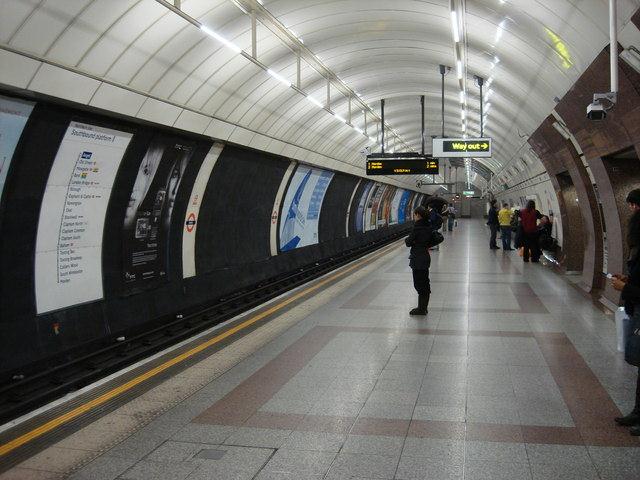 Themes of home and escape, family ties and independence, may be the strongest in the novel. Do these themes have personal resonance for you?
Themes of home and escape, family ties and independence, may be the strongest in the novel. Do these themes have personal resonance for you?